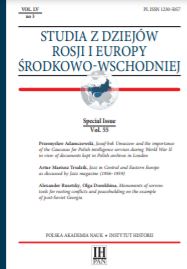The pragmatic (post-)communist: Algirdas Brazauskas - the first secretary, president, and prime minister of Lithuania
The pragmatic (post-)communist: Algirdas Brazauskas - the first secretary, president, and prime minister of Lithuania
Author(s): Krzysztof BuchowskiSubject(s): Political history, Transformation Period (1990 - 2010), History of Communism, Post-Communist Transformation
Published by: Instytut Historii im. Tadeusza Manteuffla Polskiej Akademii Nauk
Keywords: Lithuania; Soviet Union; Communist Party of Lithuania; perestroika; Sąjūdis; first secretary; president; prime minister; NATO; Russia;
Summary/Abstract: The article is devoted to Algirdas Brazauskas, president (from 1993 to 1998) and prime minister (from 2001 to 2006) of Lithuania. While Lithuania remained part of the USSR, Brazauskas pursued a career in the Communist Party of Lithuania (part of the Communist Party of the Soviet Union) as a top official and member of the nomenclature. He belonged to a generation for which membership in the communist party was the only road to professional advancement and a career. Brazauskas insisted that among party members only a few percent were “true” communists. The others, like him, worked for the good of the country by using whatever opportunities they had. During the perestroika, he was perceived as a party reformer and, supported by the Sąjūdis, became the first secretary of the Communist Party of Lithuania, eventually breaking away from the CPSU. In 1990, he was one of those who signed the act of Lithuanian independence and also became a deputy prime minister. However, after the collapse of the USSR he was politically sidelined. In 1992, his post-communist party won the parliamentary elections, taking advantage of a crisis in the Sąjūdis government. In 1993, he became president, and his presidential term is generally viewed in a positive light. In line with the constitution, as president he dealt mostly with foreign policy. With his term ending, he declined to run for another, reacting badly to criticism of his limited competences. After a brief retirement spell, he organised a left-wing coalition and returned to power as prime minister. Leading the government fulfilled his expectations, because he was able to focus on economic and administrative issues. His achievements are, however, negatively viewed.
Journal: Studia z Dziejów Rosji i Europy Środkowo-Wschodniej
- Issue Year: 55/2020
- Issue No: Sp.
- Page Range: 191-214
- Page Count: 24
- Language: English

